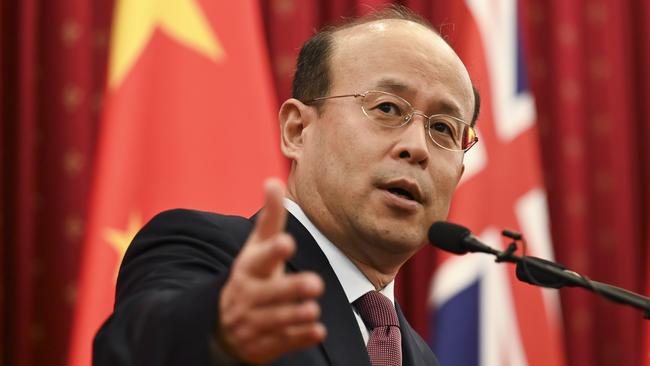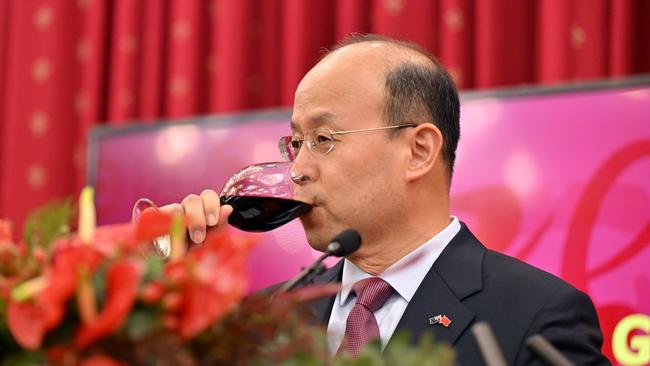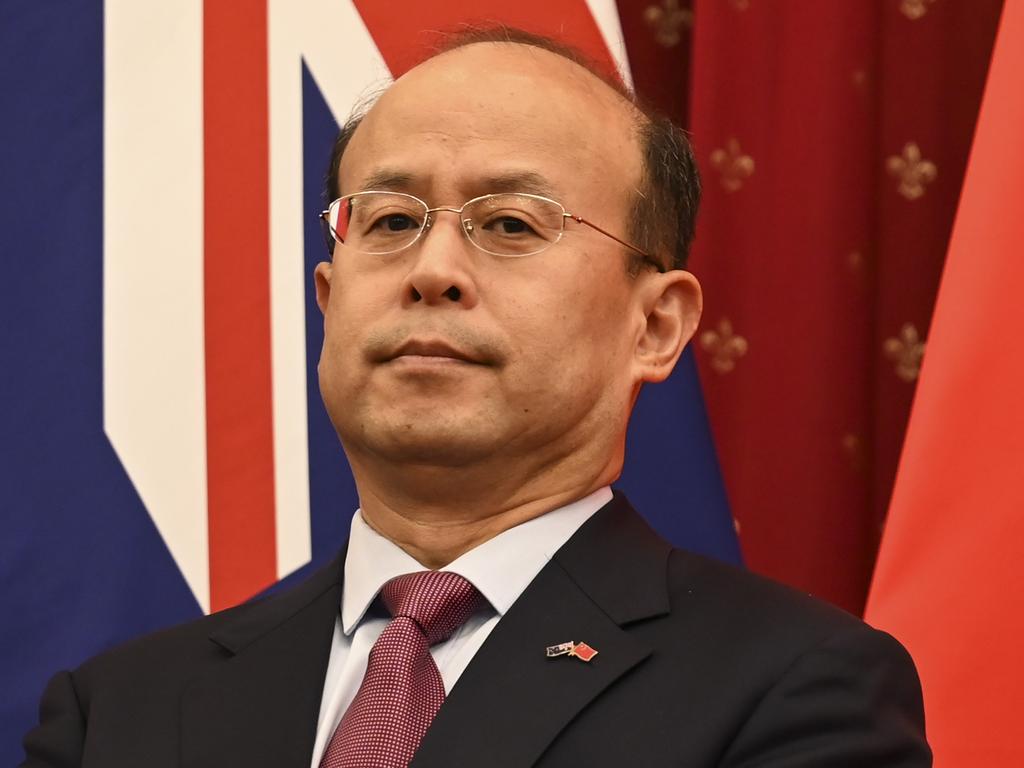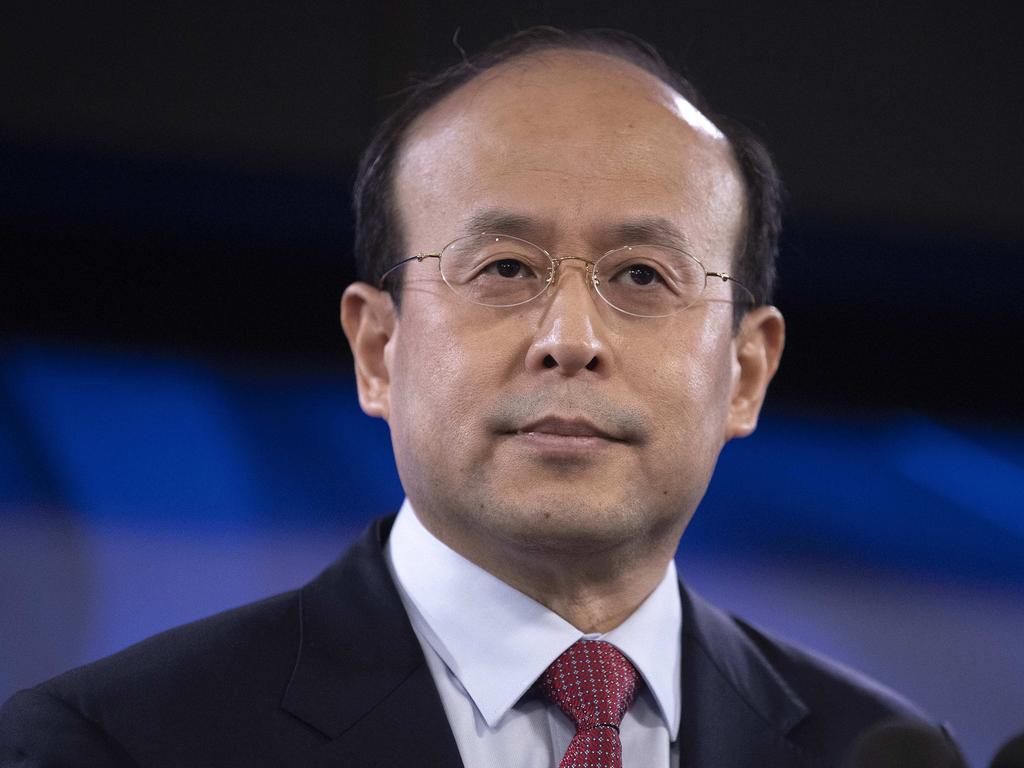Chinese ambassador Xiao Qian dives into threats and denial over sonar
Beijing’s envoy in Canberra has accused the government of falsely claiming China was responsible for harming Australian divers, while rebuking Anthony Albanese for supporting elections in Taiwan.

Beijing’s envoy in Canberra has accused the government of falsely claiming China was responsible for harming Australian divers with a sonar pulse, while rebuking Anthony Albanese for publicly supporting free democratic elections in Taiwan, suggesting it breached the spirit of the “One China” policy.
Speaking in Canberra on Wednesday, Chinese ambassador to Australia, Xiao Qian, tried to shift blame for the sonar pulse incident last November to China’s historic enemy, Japan, and claimed the Australian divers would have been killed if China’s sonar technology had been deployed.
Mr Xiao’s comments are the most direct and forceful Chinese response to date to Australia’s assertion that its navy divers were subjected to sonar pulses issued by a Chinese destroyer in an incident in international waters on November 14 last year.
In a two-hour press conference, Mr Xiao also revealed Beijing had made “serious representations” protesting the government’s expression of congratulations to Taiwan’s new president-elect and China-sceptic, William Lai, following the elections in the island territory on the weekend.
He reminded Australia there was “no room at all” for compromise or flexibility on Taiwan. “I can share with you that through diplomatic channels we have communicated with the Australian side and we have made our serious representations that we are strongly opposed to such a statement,” he said.
Mr Xiao said the One China principle was the “foundation of the relationship between China and Australia” and hoped the Australian government would take this seriously “not only in words, but also in deeds.”
The Prime Minister said on Wednesday the government would “stand up for Australia’s values consistently” and did not seek to have the relationship with China defined “by our differences”. “What we say is we’ll co-operate where we can, disagree where we must, but engage in our national interest,” Mr Albanese said. “And effectively in Taiwan there’s been no change in the regime there.
“The political party that was in power is still in power and our position has not changed. We congratulate the new leadership, the transition that has occurred through a democratic process, and we respect democratic processes. We do that while maintaining our clear bipartisan position, which is there in place for a one-China policy.”

Mr Xiao downplayed hopes China would release jailed Australian academic Yang Hengjun in coming months, while denying China had used its financial influence to sway Nauru into severing its relations with Taipei.
However, in an attempt to capitalise on thawing Sino-Australian relations, Mr Xiao also signalled Beijing’s desire to get “something more” out of its stabilised relationship with the Albanese government and argued Australia and China should explore deeper defence ties in 2024, including the prospect of joint military exercises.
He said Beijing wanted to “move beyond stabilisation, move beyond improvement, and move towards further development of our bilateral relationship”.
Mr Xiao used the press conference to promote a more positive outlook for Australia/Chinese bilateral relations where both nations viewed each other in a “rational, friendly and inclusive manner”. He also provided an assurance that Australia’s relationship with the US and China could “coexist at the same time” and claimed that China was prepared to co-operate with America in coming years.
“China and the United States … we are trying to find out what’s the best way to deal with each other as two major countries,” he said.
“The world is big enough for countries like China, United States and many other countries to coexist. You don’t have to worry about a future China trying to challenge American superpower status, trying to squeeze the Americans out of East Asia. That’s not going to happen. That’s not our policy.”
However, Mr Xiao suggested Japan may have been responsible for the injury of Australian sailors in last November’s sonar pulse incident. “They (the Chinese) didn’t initiate the so-called sonar against the divers from the Australian side,” he said. “Should they have initiated the sonar from the Chinese ship against the divers it would cause immediate fatality.’
The federal government last year took aim at a People’s Liberation Army-Navy (PLA-N) destroyer for an “unsafe and unprofessional interaction” inside Japan’s Exclusive Economic Zone.
The government accused the Chinese warship of using its “hull-mounted sonar in a manner that posed a risk to the safety of the Australian divers”, who were clearing fishing nets from the propellers of the HMAS Toowoomba.
But Mr Xiao on Thursday noted there was a third Japanese vessel in the area at the time and said this information was relayed to the Albanese government and Peter Dutton.
“Whether or not there was sonar from the other side, other party, we are not sure. Perhaps our Australian colleagues can find out,” he said.
Mr Albanese stood by the government’s criticism of the Chinese over the incident.
“We made strong representations to China about this incident. And we stand by the representations that we made,” he said.
A spokesman for the Japanese Embassy said the embassy didn’t know what had been said on the matter but that generally speaking, Japan always abided by the rule of law.
“Japan and Australia as the core of a partnership of like-minded countries in the Indo-Pacific region, unambiguously abide by the rule of law and have been promoting security cooperation across a wide range of areas under the Japan-Australia Joint Declaration on Security Cooperation,” the spokesman said.
Former Japanese ambassador to Australia Shingo Yamagami posted on social media platform X that the comments were a “classic example of evading responsibility”.
As he tried to set the scene for the coming year in Sino-Australian relations, Mr Xiao said the relationship with Australia was moving beyond the stabilisation phase after a year of “exchange, dialogue and improvement”.
Mr Xiao argued there was a “need to look at the defence relationship between China and Australia”.
“I want to be honest that … the defence relationship between our two countries is an area where we need to more input and work harder on,” he said. “This is an area that is so important to the mutual trust and confidence between our two countries and two peoples … You have trust and friendship in many areas, but not in defence.
“As ambassador, I would like to see more interactions (and) engagement between (our) two defence peoples. We used to have it … mutual visits, joint military exercises, you know, all kinds of things. This is an area I hope in this New Year we can make some progress.”
Additional reporting: Sarah Ison








To join the conversation, please log in. Don't have an account? Register
Join the conversation, you are commenting as Logout